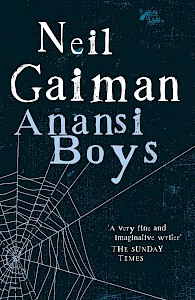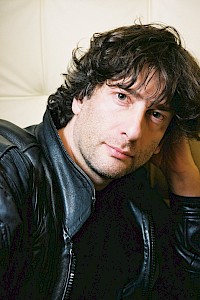Incy Wincy Spider
Format: Hardback.
Published by: REVIEW.
Release date: September 20th, 2005.
Neil Gaiman. Bit of a name, really, in the fantasy community. You may not have heard of him or read his work, because he's not the sort of fantasy writer everyone makes a huge fuss over. In every genre, there is a cadre of writers, small and select, that quietly go on about their business, turning out well-written novels that receive uniformly excellent reviews and get those in the know quietly excited in a restrained fashion. I don't know why this is, or why they stay on the down-low, but it happens. Asher in sci fi, Laws in horror, Rankin in humour, Gentle in fantasy, Teran in crime...there's a good chance you may not have heard of these people, but they are truly worth checking out. Gaiman is indisputably one of them.

Gaiman, like Pratchett, is obviously very interested in gods. However, he's not so much focussed on the belief side of things, but more how gods live and their effect upon our world. The old gods featured here are a wide pantheon of animal totems, going way back before Zeus and Odin, before Shiva and Jesus. You will meet Tiger and Elephant, Hyena and Bird, Monkey and Dragon, and of course, Anansi, the spider god, the trickster god (akin to Loki in the Norse pantheon, but not so evil). But Gaiman doesn't really bother with religion either, perhaps because it's so intrinsically connected with belief (or at least it should be) or perhaps because the religion here is not one of worship and prayer, but something a lot more primal. Stories. Thousands of years ago, man crowded around the fire and told stories about Lion and Gazelle, Crocodile and Snake, keeping the darkness back with the light of the fire, and keeping it out of their minds with stories. They listened, as they cleaned furs and sharpened stone spearheads, cooked meat and held their children close, with the cold night waiting outside the cave. Our ancestors, coming out of whatever continent you like, you pays your money and takes your choice, listened to those stories with wide eyes and they laughed and cried along with them.
Perhaps the telling of the story is the most important part, but more likely it is the listening. It's immaterial anyway, because all stories are a web, enclosing people and places and times, joining each to each with a strand of events, Fate or perhaps Providence spinning away. But it makes no difference, because all stories are Anansi's, and he understands webs better than anybody does.
Gaiman winds a tale about old gods in and about a modern setting, something he did most predominantly with that fucking corker of a novel, American Gods, and replicates again here, although with a much stronger undercurrent of humour. The mundane setting fixes us firmly in reality, this is most definitely our world, no question. Then when the weird shit starts to happen, it is presented in the same uncomplicated prose as the previous everyday events, so that you find yourself incorporating it flawlessly. It's a wonderful style; slightly under-describing everything, real and fantastic alike, sketching the outlines and letting you imagine the fine detail (as long as that particular ability hasn't atrophied). This also prevents you from imagining something differently to how it is described in the book, which is often a problematic experience. Applause to Gaiman for dodging this 'un. Ghosts and gods mix with Chinese takeaway and the ancient art of karaoke. Our initial smidgens of disbelief are displayed simultaneously through Fat Charlie, giving us an outlet for our doubts as the story unfolds and he struggles to get rid of his guiltless brother.
As the book progresses each character has conflicts, internal and external, with the world around them. Fat Charlie has considerable trouble coping with Spider's abilities, and the new knowledge that his father was a god. Spider suddenly finds himself becoming attached to the ordinary life he has appropriated. In a more general sense, pragmatists are hit with a dose of unreality, which they cannot deny to be real. Fantasists are walloped upside the head with a dose of reality, being brought down to earth with a solid thump. I think most of any good story is the characters, and Gaiman has succeeded here. You can empathise with Fat Charlie's embarrassment over his parentage, even before he finds out his father is a god, because we have parents and they embarrass us. For those of you that are orphans, trust me, your parents would have embarrassed you too. That empathy roots us firmly with him, and although he is a passive sort of chap, you can't help but like him and hence when he finally does something it is more admirable than if he were always kicking arse and taking names.
There are some high quality evil bastards about, too. Grahame Coats (not 'Grahame', 'Coats', or even 'Mr Coats' but always the full thing. You can tell he's a shit already) is Fat Charlie's boss, and a genuinely bad bloke with proper depth to him. Falling under the influence of one of the harsher old gods, he begins a mental transformation that is sure to end in bloodletting. None of the deities are what you would call kind, certainly no one is in the same sort of group as JC and the harps and wings crowd, but some of them are total bastards. They're the kind of god that makes Scientology a viable choice.

Gaiman is similar to Pratchett (or Pratchett to Gaiman, I don't know who was first) in that they mix other worlds with ours, it's just the amounts and how the integration happens that varies. Pratchett opts for sly down-an-alley-in-the-window sidling, while Gaiman simply lays it out neatly right before you. Pratchett takes things from our world and moves them into the Discworld, to our delight at the inhabitant's attraction and confusion. Gaiman moves things from other worlds into ours. Although I enjoy Pratchett more, I think Gaiman is the better writer, and this novel is another quietly and carefully spun strand of his web, strong with story and character.
And how many books have gods singing karaoke in them?
